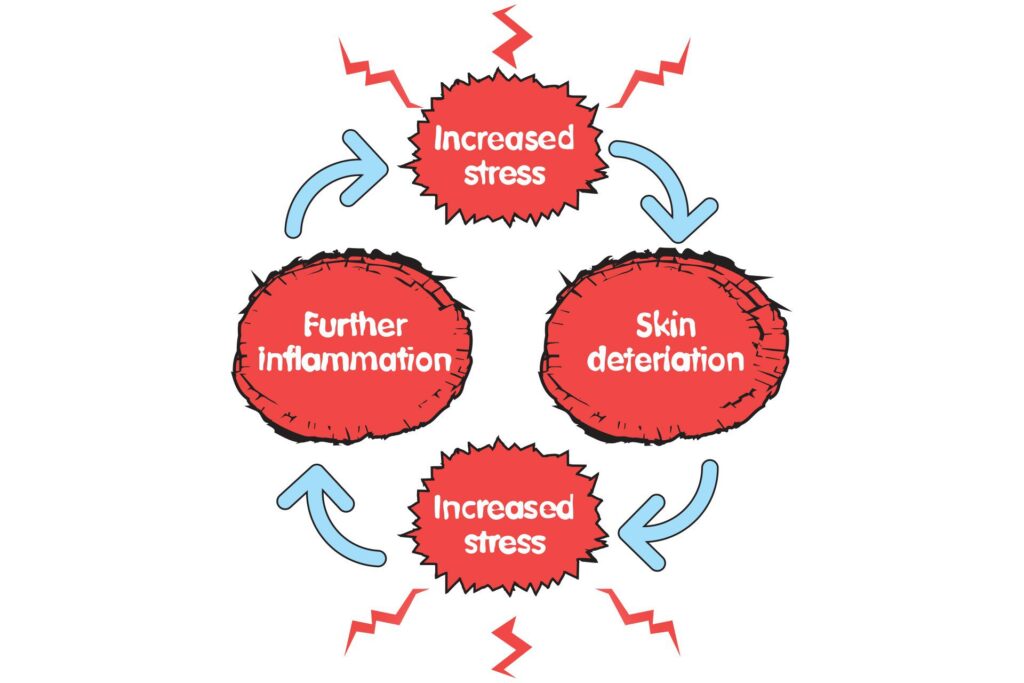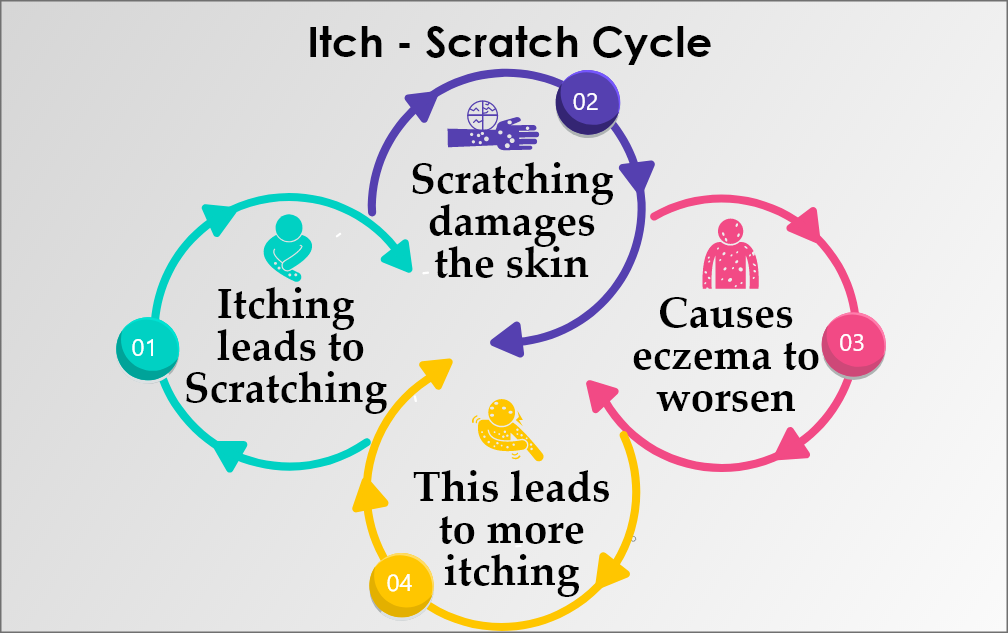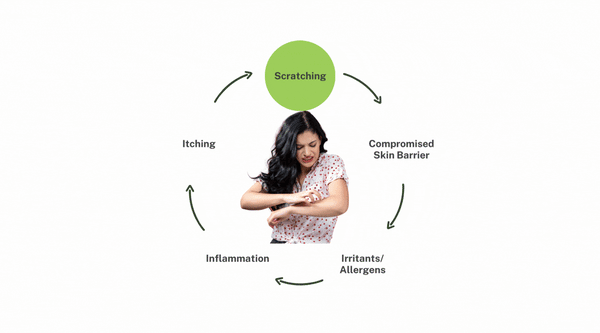Living with eczema can be a challenging and frustrating experience, especially when stress seems to aggravate the symptoms further. But fear not, because in this article, we will explore the connection between eczema and stress, and discover effective strategies to break the cycle. It’s time to bid farewell to those sleepless nights and constant itchiness, and regain control over your skin’s health. Read on to uncover the secrets to managing eczema and reducing stress levels for a happier and itch-free life.

Understanding Eczema
Eczema, also known as atopic dermatitis, is a chronic inflammatory skin condition that affects millions of people worldwide. It is characterized by dry, itchy, red, and inflamed patches of skin. Eczema can vary in severity, with some individuals experiencing occasional flare-ups and others having more persistent symptoms. Understanding the different types of eczema can help individuals better manage their condition and find effective treatment options.
What is Eczema?
Eczema is a condition that affects the skin’s ability to retain moisture, leading to dryness and inflammation. It is often accompanied by intense itching, which can result in scratching and further damage to the skin. Eczema can occur at any age, but it most commonly begins in early childhood. While the exact cause of eczema is unknown, it is believed to be a combination of genetic and environmental factors.
Types of Eczema
There are different types of eczema, each with its own unique characteristics and triggers. The most common types include atopic dermatitis, contact dermatitis, and nummular eczema.
-
Atopic dermatitis: This is the most common form of eczema and typically begins in infancy or early childhood. It is characterized by dry, itchy skin that can become red and inflamed. Atopic dermatitis is often associated with other allergic conditions such as asthma and hay fever.
-
Contact dermatitis: This type of eczema occurs when the skin comes into direct contact with an irritant or allergen. Common triggers include certain fabrics, soaps, detergents, and metals.
-
Nummular eczema: Nummular eczema presents as round or coin-shaped patches of inflamed skin. It is often triggered by dryness and can be worsened by cold weather.
The Link Between Eczema and Stress
Stress is known to have a significant impact on various aspects of our health, including our skin. In the case of eczema, stress can exacerbate symptoms and lead to more frequent flare-ups. Understanding the relationship between stress and eczema can help individuals identify triggers and develop effective stress management strategies.
Impact of Stress on Eczema
When you experience stress, your body releases certain hormones and chemicals that can affect the immune system. In individuals with eczema, this immune system response can disrupt the skin’s barrier function and increase inflammation, making the skin more susceptible to eczema flare-ups. Stress can also worsen itchiness, leading to a vicious cycle of scratching and further skin damage.
How Stress Triggers Eczema Flare-ups
Stress can trigger eczema flare-ups through various mechanisms. Firstly, stress can impair the skin’s natural healing process, making it harder for the skin to repair itself and maintain its protective barrier. Additionally, stress can stimulate the release of certain substances in the body that promote inflammation, further aggravating eczema symptoms. Finally, stress can also lead to changes in the skin’s microbiome, the balance of beneficial and harmful bacteria on the skin, which can contribute to eczema flare-ups.

Identifying and Managing Stress
Recognizing the signs of stress and identifying common stressors can help individuals with eczema effectively manage their condition. By implementing stress management techniques, individuals can minimize the impact of stress on their eczema and improve their overall well-being.
Recognizing Signs of Stress
Stress can manifest in various ways, both mentally and physically. Common signs of stress include irritability, difficulty concentrating, changes in sleep patterns, fatigue, and muscle tension. It is important to pay attention to these signs and take proactive steps to alleviate stress before it worsens eczema symptoms.
Common Stressors for Individuals with Eczema
Everyone’s stressors may vary, but individuals with eczema often face common triggers. Some of the common stressors for individuals with eczema include:
-
Social stigma: Eczema can sometimes lead to social embarrassment and negative self-image, leading to increased stress levels.
-
Itchiness and discomfort: Constant itching and discomfort associated with eczema can be stressful, affecting the quality of life and overall well-being.
-
Sleep disturbances: Eczema flare-ups can disrupt sleep patterns, leading to fatigue and increased stress levels.
Stress Management Techniques for Eczema
There are various stress management techniques that can help individuals with eczema reduce stress levels and improve their skin condition. Some effective techniques include:
-
Deep breathing exercises: Deep breathing can help activate the body’s relaxation response and reduce stress levels. Practice taking slow, deep breaths in through your nose, and exhaling slowly through your mouth.
-
Mindfulness and meditation: Incorporating mindfulness and meditation into your daily routine can help reduce stress levels and promote relaxation. Set aside a few minutes each day to focus on the present moment and engage in calming activities such as meditation or yoga.
-
Regular exercise: Exercise is not only beneficial for overall health but can also help reduce stress levels. Engage in activities you enjoy, such as walking, swimming, or yoga, to incorporate regular exercise into your routine.
The Role of Lifestyle Changes
In addition to managing stress, certain lifestyle changes can also play a significant role in managing eczema symptoms. Making adjustments to your diet, engaging in regular physical activity, and prioritizing quality sleep can all contribute to improved skin health.
Diet and Eczema
Although there is no specific eczema diet, certain dietary changes may help reduce inflammation and improve skin health. Some individuals may find it beneficial to avoid common trigger foods such as dairy, gluten, and processed sugars. Increasing the consumption of omega-3 fatty acids, found in foods like fatty fish and flaxseeds, can also have anti-inflammatory effects on the skin.
Exercise and Eczema
Regular exercise not only helps manage stress but can also improve overall skin health. Engaging in physical activity increases blood circulation, which promotes the delivery of oxygen and nutrients to the skin. Exercise can also help regulate immune system responses, reducing inflammation and minimizing the severity of eczema symptoms.
Sleep and Eczema
Quality sleep is essential for overall health and well-being, including skin health. Eczema flare-ups can disrupt sleep patterns, leading to increased stress and worsening symptoms. Establishing a bedtime routine, creating a sleep-friendly environment, and implementing relaxation techniques can help improve the quality of sleep and minimize eczema-related sleep disturbances.

Cognitive Behavioral Therapy for Eczema
Cognitive Behavioral Therapy (CBT) is a well-established therapeutic approach that helps individuals identify and change negative thought patterns and behaviors. It is often used in the treatment of various mental health conditions and has shown promise in managing eczema and associated stress.
Overview of Cognitive Behavioral Therapy
CBT aims to help individuals develop healthier attitudes and behaviors by challenging and replacing negative thoughts with more positive and constructive ones. It involves identifying triggers, recognizing negative patterns of thinking, and implementing practical strategies to cope with stress and manage eczema symptoms.
CBT Techniques for Eczema Sufferers
CBT techniques can be applied to help individuals with eczema manage their stress and improve their overall well-being. Some common CBT techniques that may be helpful include:
-
Cognitive restructuring: This involves identifying and challenging negative thoughts and replacing them with more realistic and positive ones. For example, replacing thoughts like “My skin is a disaster, and I’ll never feel better” with “I am taking steps to manage my eczema, and I am making progress.”
-
Behavioral activation: This technique focuses on engaging in positive activities and behaviors that promote a sense of achievement and well-being. Engaging in activities that you enjoy, such as hobbies or spending time with loved ones, can help counteract the negative impact of stress on eczema.
Benefits of CBT for Eczema and Stress Management
CBT can provide individuals with eczema effective tools to manage stress and improve their skin health. By addressing negative thought patterns and implementing healthy coping strategies, individuals can break the cycle of stress and eczema flare-ups. CBT can also provide individuals with a greater sense of control over their condition, leading to improved emotional well-being and overall quality of life.
Natural Remedies to Combat Eczema and Stress
In addition to traditional medical treatments, many individuals with eczema opt for natural remedies to alleviate symptoms and reduce stress. While natural remedies may not replace medical treatments, they can be used in conjunction with them to enhance overall well-being.
Herbal Treatments for Eczema and Stress Reduction
Certain herbs and plant-based remedies have been used for centuries to alleviate eczema symptoms and reduce stress levels. Some commonly used herbal treatments for eczema include:
-
Chamomile: Chamomile has anti-inflammatory properties and can help calm irritated skin. It can be applied topically or consumed as chamomile tea.
-
Calendula: Calendula has soothing and healing properties, making it beneficial for eczema-prone skin. Calendula creams or ointments can be applied topically to reduce inflammation and itching.
Stress-Relieving Techniques
Incorporating stress-relieving techniques into your daily routine can help alleviate stress and improve your eczema symptoms. Some effective stress-relieving techniques include:
-
Progressive muscle relaxation: This technique involves tensing and then releasing different muscle groups to promote relaxation and reduce stress levels.
-
Journaling: Writing down your thoughts and feelings can help identify triggers and provide an outlet for stress. Consider keeping a journal to record your emotions and track any patterns between stress and eczema flare-ups.
Aromatherapy and Eczema
Aromatherapy involves using essential oils derived from plants to promote relaxation and balance. While not a standalone treatment for eczema, certain essential oils can be used as part of a comprehensive management plan. Lavender, tea tree, and chamomile essential oils may help reduce stress, soothe irritated skin, and promote better sleep.

Medication and Medical Treatments
For some individuals with severe eczema, medical treatments may be necessary to manage symptoms effectively. These treatments can complement lifestyle changes, natural remedies, and stress management techniques.
Topical Steroids for Managing Eczema
Topical steroids are commonly prescribed to reduce inflammation and relieve itching associated with eczema. They work by reducing the immune response and suppressing the inflammatory process in the skin. Topical steroids are available in various strengths and forms and should be used as directed by a healthcare professional.
Immunosuppressants and Biologics
In more severe cases of eczema that are resistant to other treatments, immunosuppressant medications or biologics may be prescribed. These medications work by suppressing the immune system to reduce inflammation and improve symptoms. They are typically used when other treatment methods have not provided sufficient relief.
Addressing Stress through Medication
In some cases, individuals with eczema may benefit from medications to manage stress and its impact on the skin. Anti-anxiety medications or antidepressants may be prescribed to help individuals cope with stress and reduce its effect on eczema symptoms. It is important to work closely with a healthcare professional to determine the most suitable medication and dosage.
Creating a Support System
Dealing with eczema can be challenging, both physically and emotionally. Developing a strong support system can provide individuals with the necessary encouragement and understanding to navigate their eczema journey.
Importance of Emotional Support
Emotional support plays a crucial role in managing eczema and stress. Surrounding yourself with individuals who understand your condition and offer encouragement can provide a sense of belonging and reduce feelings of isolation. Friends, family members, or support groups can be valuable sources of emotional support.
Joining Eczema Support Groups
Joining eczema support groups, either in-person or online, can be a valuable way to connect with others who are going through similar experiences. Support groups provide a platform to share tips, discuss challenges, and offer emotional support. They can also serve as an opportunity to learn about new treatment options and coping strategies.
Professional Help for Eczema and Stress
In addition to the support of friends and family, seeking professional help can be beneficial for managing eczema and stress. Dermatologists, therapists, and other healthcare professionals can provide expert guidance and tailored treatment plans. They can also provide additional resources and connect individuals with specialized services if needed.

Developing a Skincare Routine
Establishing a consistent skincare routine is essential for individuals with eczema. By using the right products and practicing proper skincare techniques, individuals can help soothe their skin, prevent flare-ups, and maintain overall skin health.
Choosing the Right Products for Eczema-Prone Skin
When selecting skincare products, it is important to choose ones that are gentle and suitable for sensitive skin. Look for products that are fragrance-free, hypoallergenic, and hydrating. Avoid ingredients that may further irritate the skin, such as alcohol, fragrances, and harsh detergents.
Effective Skincare Techniques
Proper skincare techniques can help minimize irritation and protect the skin’s barrier function. Some effective skincare techniques for individuals with eczema include:
-
Gentle cleansing: Use mild, fragrance-free cleansers and avoid scrubbing the skin, as this can further irritate and dry out the skin.
-
Moisturizing: Moisturizing regularly is essential to keep the skin hydrated and prevent dryness. Apply a moisturizer immediately after bathing to lock in moisture.
Tips for Soothing Eczema Flare-ups
During eczema flare-ups, it is important to provide the skin with extra care and attention. Some tips for soothing flare-ups include:
-
Applying cool compresses: Cool compresses can help reduce inflammation and soothe itchy skin. Apply a damp, cool cloth to affected areas for 10-15 minutes at a time.
-
Avoiding irritants: Identify and avoid any potential irritants that may trigger or worsen flare-ups. This may include certain fabrics, harsh detergents, or specific skincare products.
Long-Term Management Strategies
While eczema cannot be cured, long-term management strategies can help individuals maintain healthy skin and prevent recurrent flare-ups. By adopting healthy habits and staying vigilant, individuals can effectively manage their eczema and minimize its impact on their daily lives.
Maintaining Healthy Habits
Consistency is key when it comes to managing eczema. By maintaining healthy habits, individuals can optimize their skin health and reduce the frequency and severity of flare-ups. Some important healthy habits include:
-
Following a skincare routine: Stick to a consistent skincare routine that includes gentle cleansing, regular moisturizing, and avoiding harsh irritants.
-
Practicing stress management: Continue implementing stress management techniques to minimize the impact of stress on eczema.
Monitoring and Preventing Recurrences
Keeping track of eczema flare-ups and identifying potential triggers can help individuals prevent recurrences. Some tips for monitoring and preventing recurrences include:
-
Keeping a journal: Record any changes in your symptoms, potential triggers, and any noteworthy details that may help identify patterns or triggers.
-
Avoiding known triggers: If certain foods, fabrics, or skincare products have triggered flare-ups in the past, avoid or minimize exposure to them.
Conclusion
Managing eczema and the associated stress requires a comprehensive and personalized approach. By understanding the link between eczema and stress, identifying stressors, and implementing effective stress management techniques, individuals with eczema can improve their skin health and overall well-being. In conjunction with medical treatments and natural remedies, the development of a supportive network and consistent skincare routine can help individuals lead a fulfilling life while managing their condition. Remember to consult with healthcare professionals for personalized advice and treatment options that best suit your needs. With patience and perseverance, it is possible to break the cycle of eczema and stress, and regain control of your skin and quality of life.